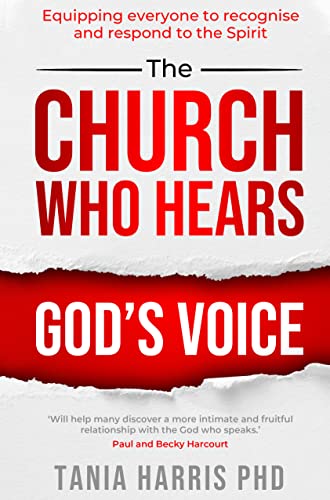Tania Harris: The Church Who Hears God’s Voice
 Tania Harris, The Church Who Hears God’s Voice: Equipping Everyone to Recognise and Respond to the Spirit (Paternoster, 2022), 320 pages, ISBN 9781788932462.
Tania Harris, The Church Who Hears God’s Voice: Equipping Everyone to Recognise and Respond to the Spirit (Paternoster, 2022), 320 pages, ISBN 9781788932462.
This book is a revision of Tania Harris’s dissertation in practical theology written under Jon Newton at Alphacrucis University College. It is based on her doctoral research, but it is also informed by her experience as an ordained minister of the Australian Christian Churches and as the founding director of God Conversations, a ministry that seeks to train believers and churches on actively and responsibly hearing from God. The book offers theological and practical guidance on fostering relationships with God through prayer.
The book opens by describing the events that led to Harris’s research and ministry focus. Her intent is to help build up the church as the place where believers expect to hear from God and are trained on how to respond to what they hear. This component of the Christian life is so important because, according to Harris, the Christian God is distinguished by his knowability and personhood. The self-revelation of God in Christ and in the abiding presence of the Spirit is the basis of humanity’s relationship with God. To frame her discussion, she narrates historical changes in Christian spirituality that shaped how Christians have expected or not expected to hear from God in their daily lives. Throughout the book, she provides short stories on how people have either benefited from acting on the revelation they receive or how their failure to discern properly had disastrous consequences. A central concern of the book is the potential problems that personal revelation and prophecy can cause within churches. These problems can cause some leaders to discourage such practices, yet Harris sees the problems as all the more reason to train people on the responsible exercise of the practices.
Tania Harris wants to help build up the church as the place where believers expect to hear from God and are trained on how to respond to what they hear.
Harris’s book is compelling because it exemplifies the theology it advocates. Her understanding of pastoral leadership is such that church leadership is to help the believers under their care grow in their ability to hear from God, which she does throughout this book. The thorough research she undertakes in scripture and Christian spirituality is oriented towards fostering the maturity of readers. The book is to be commended also for its consciously ecumenical grounding. Harris herself is steeped within the Pentecostal tradition, yet she views it as a scholarly and ministerial necessity to engage Catholic and Protestant spiritual traditions in her discussion of revelation. She is more positive in her treatment of Catholic than Protestant sources; there are even times she draws on Catholic thought in critiquing trends within Pentecostal circles. She also evidences familiarity with contemporary questions and convergences within the ecumenical movement regarding divine revelation. Though the book was written by a Pentecostal scholar at a Pentecostal university, it is not confessionally narrow.
Tania Harris insists everyone can hear from God, whether they are a mystic in a convent, a corporate leader, or a busy mother at home.
I commend the book for its serious, practical, and pastoral insight into the value of cultivating an active relationship with God. The book is written for mature Christians who are theologically literate even if not theologically trained. There are lingering questions on some doctrinal claims made, but these do not detract from the value of the book. Harris pulls off a rare accomplishment in distilling years of research and experience into a work that will contribute to the spiritual lives of churches—an example of practical theology at its best.
Reviewed by Joey Baker
Read an excerpt appearing at PneumaReview.com: “The Theological Problem of Spirit Versus Scripture”
Author’s bookstore page (where you may download and read an additional sample chapter): https://www.godconversations.com/product/the-church-who-hears-gods-voice/
Category: Spirit, Summer 2023


